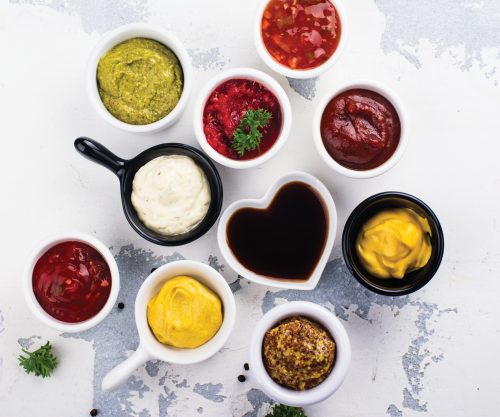The Magic of Emulsifier In Food Explained for Everyone
Wiki Article
Learn Exactly How an Emulsifier in Food Can Aid Achieve Flawlessly Mixed Dishes Every Single Time
Emulsifiers are important ingredients in the culinary world, making it possible for the mixing of oil and water-based parts. Their capability to decrease surface stress allows for the creation of steady mixtures, boosting both appearance and taste in numerous meals. Recognizing exactly how these substances feature can transform the way one comes close to food preparation. Yet, many continue to be uninformed of the various kinds of emulsifiers and their specific applications. Exploring this topic exposes useful understandings for attaining culinary perfection.What Are Emulsifiers and Exactly How Do They Function?
Emulsifiers play a crucial duty in the food sector by enabling the steady mixing of active ingredients that typically do not combine, such as oil and water. These materials have both hydrophilic (water-attracting) and hydrophobic (water-repelling) residential properties, allowing them to communicate with both types of active ingredients. When an emulsifier is contributed to a mixture, it lowers the surface area tension between the oil and water, promoting the formation of small droplets of one liquid distributed within the various other. This procedure develops a secure solution, stopping separation with time and enhancing structure and mouthfeel. Emulsifiers are basic in various food items, from salad dressings to gelato, guaranteeing uniformity and top quality. They likewise add to the overall sensory experience of food, influencing flavor release and aesthetic allure. Understanding exactly how emulsifiers function is important for food scientists and chefs alike, as they seek to develop delightful and balanced cooking experiences.Typical Kinds Of Emulsifiers Made Use Of in Food Preparation
Many kinds of emulsifiers are utilized in food preparation to accomplish preferred textures and stability in various foodstuff. Common emulsifiers include lecithin, which is normally discovered in egg yolks and soybeans, and is commonly utilized in mayonnaise and dressings. An additional widespread emulsifier is mustard, which has compounds that assist blend oil and water in sauces.In addition, commercial emulsifiers such as mono- and diglycerides are frequently included in refined foods to enhance their stability and boost rack life. Starch-based emulsifiers, originated from corn or potatoes, are likewise used in gravies and desserts for enlarging and structure. Casein, a milk protein, serves as an emulsifying agent in milk items like cheese and cream. Each of these emulsifiers plays a necessary role in making certain that ingredients mix effortlessly, supplying the preferred consistency and flavor in culinary productions.
The Scientific research Behind Emulsification

The stability of an emulsion counts on the balance in between the forces acting upon the distributed beads. If the droplets coalesce, the solution can damage, bring about splitting up. Different variables, such as temperature level, concentration of the emulsifier, and the method of mixing, influence the success of emulsification. Understanding this scientific foundation is crucial for achieving regular lead to cooking applications involving emulsions.
Tips for Using Emulsifiers in Your Dishes
When integrating emulsifiers into dishes, cautious consideration of their homes and capability can substantially enhance the end product. Initially, one should select the appropriate emulsifier based upon the preferred texture and stability of the recipe. Emulsifier In Food. Common options consist of egg, mustard, and lecithin yolks, each offering one-of-a-kind benefitsIt's crucial to comprehend the temperature level at which the emulsifier operates finest; for instance, some emulsifiers work properly at area temperature level, while others call for warmth. Gradually including oil to the emulsifier while blending can assist produce a stable emulsion.
Furthermore, the proportion of emulsifier to fluid is essential; inadequate might result in separation, while way too much can develop an unwanted texture. Lastly, appropriate storage problems should be considered, as some emulsified products may require refrigeration to preserve stability and freshness. By following these ideas, cooks can accomplish regularly well-blended dishes.

Delicious Recipes Featuring Emulsifiers
While several chefs might not recognize it, incorporating emulsifiers into dishes can raise meals to brand-new elevations of flavor and appearance. A traditional vinaigrette benefits substantially from the addition of mustard, which acts as an emulsifier, supplying a smooth consistency that binds oil and vinegar perfectly. In a similar way, homemade mayo showcases the power of egg yolks, creating a luscious, extravagant sauce perfect for salads and sandwiches.In cooking, emulsifiers like lecithin can assist achieve a tender crumb in cakes and muffins, improving dampness retention. A rich chocolate ganache, made with hefty lotion and delicious chocolate, can likewise include an emulsifier to preserve a smooth surface. In addition, gelato often utilize emulsifiers to ensure a creamy structure and stop ice crystal development, leading to a delightful treat experience. By incorporating these emulsifying agents, cooks can create meals that delight the taste buds and supply a satisfying mouthfeel.
Frequently Asked Inquiries
Are Emulsifiers Safe for People With Food Allergies?
Emulsifiers can be safe for people with food allergies, depending on the specific emulsifier made use of. Cross-reactivity and specific sensitivities differ; as a result, seeking advice from a medical care professional is suggested to guarantee security.Can I Make My Own Emulsifier in your home?
Yes, people can produce homemade emulsifiers using active ingredients like egg yolks, mustard, or honey. These natural choices go to this site can efficiently mix oils and water-based parts, providing an easy option for numerous cooking applications.Just How Do Emulsifiers Affect the Nutritional Value of Food?
Emulsifiers can improve the nutritional value of food by boosting nutrient absorption and security. Too much consumption might lead to damaging impacts, potentially altering digestion processes and affecting intestine wellness in sensitive individuals.Are There Any Kind Of Unfavorable Adverse Effects of Consuming Emulsifiers?
Some researches suggest that consuming emulsifiers may lead to intestinal issues or interfere with intestine microbiota balance. Nevertheless, additional research is needed to fully understand their long-lasting you could try here results on health and prospective unfavorable side results.Can Emulsifiers Change the Taste of My Recipes?
Emulsifiers can subtly alter the taste account of recipes. By improving appearance and mouthfeel, they might make flavors extra obvious or well balanced, but they usually do not convey solid preferences by themselves.Emulsifiers play an important role in the food industry by making it possible for the stable blending of ingredients that generally do not incorporate, such as oil and water. Numerous types of emulsifiers are made use of in food preparation to achieve wanted appearances and security in various food items. Additionally, industrial emulsifiers such as mono- and diglycerides are often added to refined foods to boost their stability and improve rack life. It's essential to understand the temperature at which the emulsifier works best; for circumstances, some emulsifiers function efficiently at area Homepage temperature, while others need heat (Emulsifier In Food). Emulsifiers can be safe for people with food allergies, depending on the specific emulsifier used
Report this wiki page